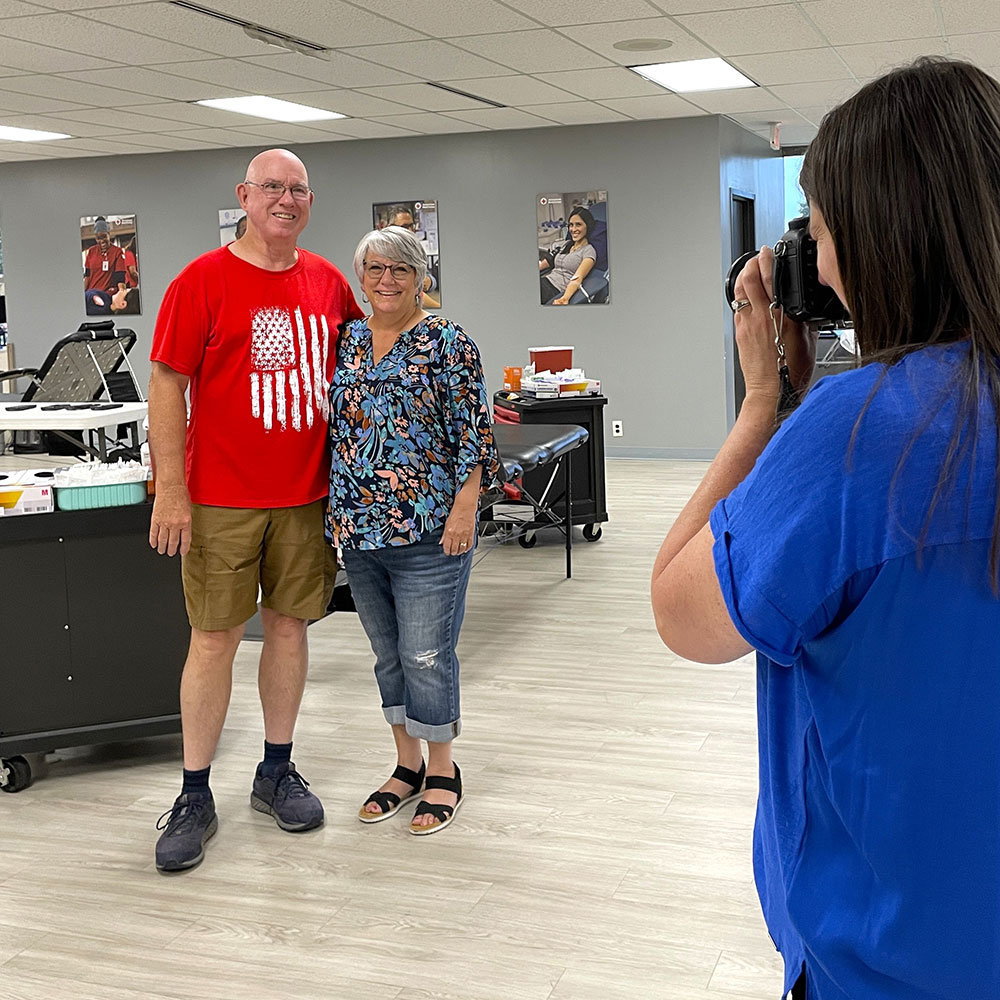
Al and Carol Cherry are photographed for an article about blood donation in TulsaPeople Magazine. Al has given more than 50 gallons of blood over half a century of donating.
Al Cherry has given more than 50 gallons of blood since he started donating over 50 years ago.
“It wasn’t my goal to hit 50 gallons when I started. My goal was just to help people,” said Al, whose prolific blood donation got him featured in a local magazine.
For this dedicated donor, giving blood has always been tied to family. Al’s parents were donors. He and his two older brothers followed in their footsteps when they were old enough. Al kept at it every chance he got, donating throughout his time in college at Oklahoma State University.
As a Navy pilot and later a commercial pilot, regulations prevented him from donating. Once restrictions eased, however, Al was right back at it. The Navy had taken him to California, and he returned to giving blood while still living in the Golden State.
Al started giving platelets in the early 1990s after moving back to Oklahoma and learning about the process at the Red Cross Tulsa Donor Center.
Al’s mom and first wife were his motivation to become and continue to be a platelet donor for the past 30 years. They both died of cancer, and Al knows platelets are vital for many patients battling cancer.
It’s difficult for him to talk about losing his first wife, but Al admires her fight against brain cancer, which included undergoing pioneering radiation treatment that has been refined into standard care today.
Al frequently meets or comes close to the annual limit on platelet donations. He finds it extremely rewarding to know how many people he’s potentially helped by giving platelets. He’s also part of a very special group of donors — his blood is CMV negative.
Cytomegalovirus, or CMV, is a common flu-like virus that up to 85% of U.S. adults have been exposed to by age 40. You can be exposed to CMV without knowing it, because most people infected with CMV have mild symptoms or no symptoms at all.
CMV can cause serious problems, however, for people with weakened immune systems, such as babies or cancer and transplant patients, adversely affecting their eyes, lungs, liver, nervous system and gastrointestinal tract. CMV can even be fatal.
Al has no way to know for sure, but there’s a good chance that his rare blood has helped people he knows. There’s one instance where he knew exactly who his platelets were helping. Al was once called to donate directly to a little girl who had been in a car wreck and needed CMV-negative platelets.
He had donated platelets the day before but gave again without hesitation when he was told it was OK to do once in a while.
“I feel really good about doing that,” he said.
Al and his wife of more than 20 years now, Carol, like to come to the Tulsa Donor Center together. They’ve gotten to know the staff and enjoy talking with them about their kids and hobbies.
“It’s a joy to come donate. Yes, they make it fun,” Carol said.
“It’s like having another family here,” Al said.
Al said donating blood is a personal decision for everyone, but he encourages people to become regular donors. He said people can “do a lot of good to a lot of people” by finding the time to donate.
“Everybody has the time. It’s just a matter of how they spend it. Might as well spend it here doing something good.”
Support all the urgent humanitarian needs of the American Red Cross.
Find a drive and schedule a blood donation appointment today.
Your time and talent can make a real difference in people’s lives. Discover the role that's right for you and join us today!